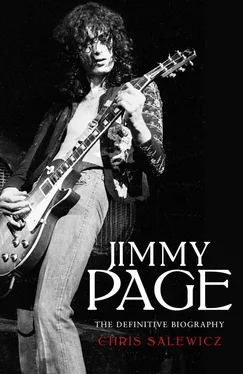HarperCollins Publishers
1 London Bridge Street
London SE1 9GF
www.harpercollins.co.uk
First published by HarperCollins Publishers 2018
FIRST EDITION
© Chris Salewicz 2018
Cover layout design Claire Ward © HarperCollins Publishers 2018
Cover photograph © Gijsbert Hanekroot/Redferns/Getty Images
Extract from I’m With the Band: Confessions of a Groupie by Pamela Des Barres published by Omnibus Press © Panela Des Barres
A catalogue record of this book is available from the British Library
Chris Salewicz asserts the moral right to be identified as the author of this work
While every effort has been made to trace the owners of copyright material reproduced herein and secure permissions, the publishers would like to apologise for any omissions and will be pleased to incorporate missing acknowledgements in any future edition of this book.
All rights reserved under International and Pan-American Copyright Conventions. By payment of the required fees, you have been granted the nonexclusive, non-transferable right to access and read the text of this e-book on screen. No part of this text may be reproduced, transmitted, downloaded, decompiled, reverse engineered, or stored in or introduced into any information storage retrieval system, in any form or by any means, whether electronic or mechanical, now known or hereinafter invented, without the express written permission of HarperCollins e-books.
Find out about HarperCollins and the environment at
www.harpercollins.co.uk/green
Source ISBN: 9780008149291
Ebook Edition © July 2018 ISBN: 9780008149307
Version: 2018-06-21
For Alex and Cole
Cover
Title Page
Copyright
Dedication
Preface
Introduction
1 SPANISH GUITAR IN SURREY
2 FROM NELSON STORM TO SESSION PLAYER
3 SHE JUST SATISFIES
4 BECK’S BOLERO
5 BLOW-UPS
6 ‘YOU’RE GOING TO KILL ME FOR A THOUSAND DOLLARS?’
7 ‘LIKE A LEAD ZEPPELIN’
8 AMERICAN ADVANCES
9 ‘WHOLE LOTTA LOVE’
10 LED ZEPPELIN II
11 ‘DO WHAT THOU WILT’
12 THE BEAST 666
13 ALL THAT GLITTERS
14 THE LEGEND OF ZOSO
15 CITY OF ANGELS
16 THE KING AND JIMMY PAGE
17 COCAINE NIGHTS AND HAUNTED HOUSES
18 AN ACCIDENT IN EXILE
19 THE KENNETH ANGER CURSE
20 FACE TO FACE
21 THE RULES OF ENGAGEMENT
22 BONZO’S LAST STAND
23 THE HERMIT
24 MIDDLE-AGED GUITAR GOD
25 THE SORCERER’S APPRENTICE
26 PHOENIX RISING
Picture Section
Sources
Acknowledgements
Index of Searchable Terms
About the Publisher
One chilly February evening in 1975, Jimmy Page journeyed in a black Cadillac limousine to David Bowie’s rented house on 20th Street in Manhattan. The Led Zeppelin leader and Bowie had known each other since the mid-sixties, Page having played on several of Bowie’s early records.
The pair were also linked through Lori Mattix, Page’s Los Angeles-based underage lover and a cause of considerable concern in the Zeppelin camp, thanks to the criminal complications this could create for the Biggest Band in the World. What few knew was that Bowie had taken Mattix’s virginity when she was just 14.
With the superstar pair having been reintroduced by Mick Jagger, Bowie had invited Page over to his place for an evening’s entertainment largely comprising lines of cocaine and glasses of red wine, along with Ava Cherry, Bowie’s girlfriend.
Mired in his Cracked Actor phase, Bowie was known to be living on milk and cocaine, and on the edge of madness. He had been inspired to devour the writings of Aleister Crowley, whose philosophy he had first dabbled in during the late 1960s: Bowie believed that Page’s deep knowledge of Crowley had enhanced the guitarist’s aura until it was rock hard and ringing with power.
But despite being intrigued, Bowie was extremely wary of Page. Conversation was somewhat stiff, although there was brief talk about Page’s progress, or lack of it, on the soundtrack to filmmaker Kenneth Anger’s occult masterpiece Lucifer Rising . Attempting to inquire how Page had developed his extreme aura, Bowie found his questions were never answered: Page would simply smile mysteriously.
‘It seemed that he did believe he had the power to control the universe,’ wrote Tony Zanetta, the head of Bowie’s management organisation MainMan, in his book Stardust . Besides, Page was only too aware that Bowie was picking his brain, endeavouring to crack a magician’s tricks.
At one point Bowie disappeared out of the room, and Page accidentally spilled red wine on a satin cushion. When the singer returned, Page tried to blame Ava Cherry, who wasn’t in the room.
His guest’s inscrutable behaviour had already rankled Bowie, and now he knew that Page was lying. ‘I’d like you to leave,’ he said.
Page’s response was simply to smile at Bowie. The window was open, and Bowie pointed at it, snapping his words out furiously: ‘Why don’t you leave by the window?’
Page remained sitting there, maintaining his enigmatic rictus smile, gazing through Bowie. Finally, the Led Zeppelin leader stood up silently, stepped towards the front door and left, shutting the door forcefully behind him.
Bowie was terrified. Immediately afterwards he ordered that the house be exorcised. A sensitive soul whose perceptions were addled by drugs, Bowie believed ‘it had become overrun with satanic demons whom Crowley’s disciples had summoned straight from hell’.
When he later ran into Page at a party, Bowie straightaway fled the event.
John Bindon, Led Zeppelin’s security guard, had stagehand Jim Matzorkis pinned to the floor of a backstage trailer at Oakland Coliseum. Bindon, a sometime actor and London gangland heavy who had reputedly once bitten off a man’s testicles and would stab another man to death the following year, was viciously pummelling Matzorkis with his fists and feet. But it was only when Bindon started trying to gouge out the stagehand’s eyes that Matzorkis fully appreciated the danger he was in.
For much of this day of Saturday 23 July 1977 the possibility of such a grim outcome had been building. Many of Zeppelin and their crew seemed in a state of permanent rage, as if they had surrendered control to the large quantities of drugs consumed during the course of a 51-date tour that had begun on 1 April.
Later, Jimmy Page would be obliged to deny to me that what happened that day was karmic recompense for his flirtations with the occult. ‘I don’t think we were doing anything … evil,’ he said, two years later.
It was especially ironic that what happened at Oakland Coliseum that day, which would utterly transform the fortunes and career trajectory of Led Zeppelin, should be on the turf of Bill Graham, whose Fillmore West had been a temple of popularity for the Yardbirds, Page’s previous group, and, along with Graham’s New York showcase the Fillmore East, the scene of early break-out triumphs for Led Zeppelin. Although the confluence of the interests of Bill Graham and Peter Grant, Led Zeppelin’s manager, had proved mutually advantageous in the past, it was always a disaster waiting to happen. Graham was the most powerful music promoter in the United States; Grant had reinvented the relationship between managers and promoters in the United States, often through heavy-handed behaviour. And as much as Grant terrified people, Graham also possessed a fierce temper.
Читать дальше












